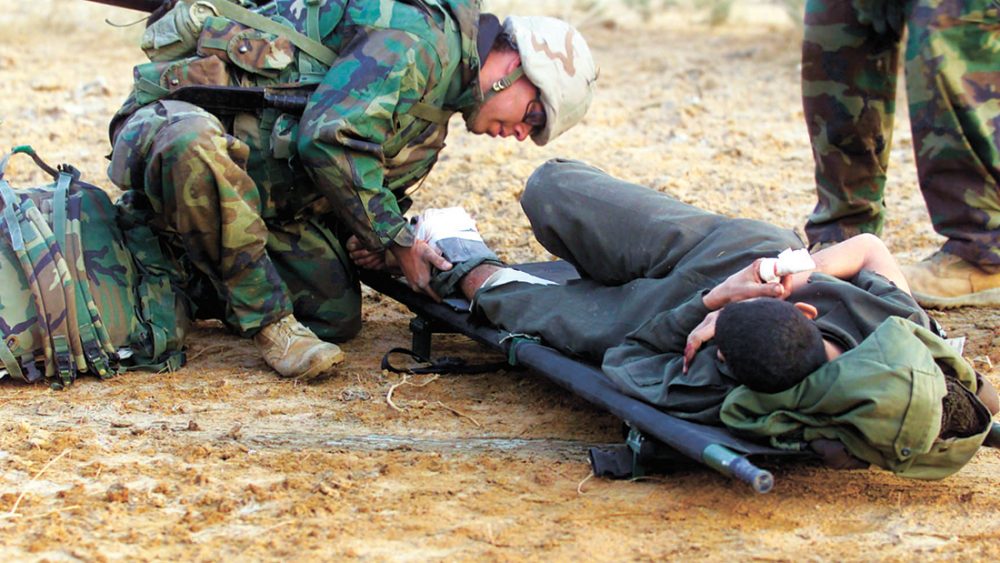My wife’s been nudging me about kindness for a long time, and I think I might be starting to get what she’s concerned about. It’s the quality we seem to realise is missing whenever some act of inhumanity occurs. Every time a tragedy occurs — the Manchester concert bombing being the latest as I write this — the ‘k’ word is always prominent. “We need to be kinder to each other.”
“The world needs more kindness.” It’s there in lyrics, too; The Indigo Girls sing, “In the end, only kindness matters” and Auld Lang Syne has us vowing to “take a cup o’ kindness” at least once a year. And, of course, there’s the Glen Campbell classic, urging people to try a little kindness as an antidote to narrow-minded bigotry.
But is kindness a bit soft?
Bible translator Myles Coverdale coined the term ‘lovingkindness’ in the 16th Century to try to capture the way God loves his people Israel. It bundles together mercy, favour and crazy love in spite of everything. Lovingkindness will overlook a multitude of blindness, to paraphrase 1 Peter 4:8.
But is kindness a bit soft? In an age where terrorist activity has become a daily expectation, surely we need to become more vigilant, more defensive, more protective, more aggressive in the face of evil.
I don’t think so. At least, not as Christians. At least, not as the church of Jesus Christ. Perhaps there’s an argument for governments increasing security, cracking down on some liberties, and being more concerned about borders than we were some decades ago.
Kindness in the face of cruel death; it is as inspiring as it is bewildering.
But even if that were true, it is not how the church can behave. We follow Jesus, whose life is saturated with kindness. In fact, the only people that Jesus behaves ‘unkindly’ towards are religious figures, particularly those who are abusing their authority over people. Jesus’ interactions with people are marked by a willingness to see the person ‘behind’ the sin, to acknowledge the difficult circumstances that shape a person’s decisions, and to give each person a second and third chance to turn from sin and towards him.
Even hanging on the cross, Jesus is empathising with the criminals hanging either side of him, the soldiers who are killing him in ignorance as part of their duty, and the poor traumatised disciples who are witnessing his death. Kindness in the face of cruel death; it is as inspiring as it is bewildering.
Lady Macbeth complains that her husband is “too full of the milk of human kindness,” which only argues for the importance of kindness if you know how the play pans out. A Christian can never be too full of kindness; there’s always room for more.
In the end, kindness emerges from viewing yourself honestly.
In his new book, Love Kindness, the President of Biola University in California, Barry H. Corey claims that kindness is the forgotten virtue of Christianity, and if we want to represent Christ in the public square (and in our homes and churches), we need to change.
In our desperation to stand for God’s truth and goodness, we have become known for unkindness. But according to Corey, “Bullhorns and fist shaking—mustering armies and using war-waging rhetoric—are far less effective than the way of kindness, treating those with whom we disagree with charity and civility.”
Christians need to make a shift, Corey says, from being soft at the centre and hard at the edges to the opposite: hard-centred theology, and soft-centred engagement with the world.
In the end, kindness emerges from viewing yourself honestly. If you are a forgiven sinner, still struggling to walk in the way of the Spirit, still failing regularly and in need of fellowship, teaching, and mercy, then kindness should come easily.
Kindness is different to gentleness, passivity, being a wuss.
But we forget to view ourselves that way. We start to feel like we’ve got it sorted, or everyone else is failing around us and we are the Warriors of Righteousness. Even such a warrior should have kindness as a weapon. And his battle is not with his neighbour, but with the spiritual forces that oppose God.
I think my wife’s point is something like this: kindness is different to gentleness, passivity, being a wuss. Kindness can look very dynamic, very intrusive, very ‘front foot’, and even a bit aggressive. Calling out injustice loudly and angrily is, in fact, kind. Making a fuss on behalf of those who can’t speak for themselves is not annoying or ‘bleeding heart’; it’s kind. Kindness searches for the hurt that can be healed, the sorrow that can be comforted, the sin that can be forgiven. As Corey writes, “Kindness embodies courage, although courage does not always embody kindness.”
It’s really up to each of us, within our own personalities and circumstance, to seek to imitate Christ’s kindness. The first step is to see ourselves in the light of Christ himself: sinners who are loved and forgiven. I can hear my wife: “Look intently in the mirror and remember who you are, and drink more milk!”
Greg Clarke is CEO of Bible Society Australia.

